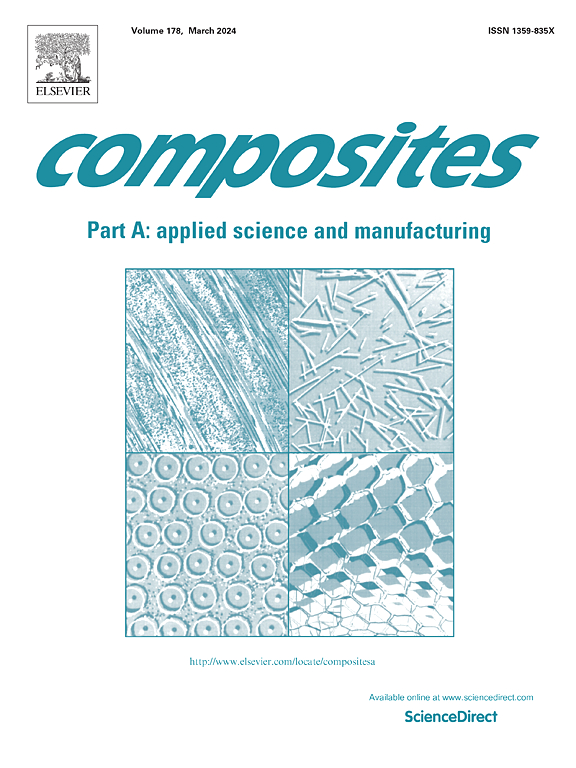Piezoelectric spray for rapid fabrication of self-powered sensor based on sustainable textiles
IF 8.1
2区 材料科学
Q1 ENGINEERING, MANUFACTURING
Composites Part A: Applied Science and Manufacturing
Pub Date : 2025-04-22
DOI:10.1016/j.compositesa.2025.108979
引用次数: 0
Abstract
Based on the principle of low-carbon economy, the fabrication and design of flexible sensors with self-power and low manufacturing cost remain challenges in smart wearable electronic systems. In this study, we fabricated a self-powered piezoelectric sensor based on sustainable textiles that can be rapidly manufactured by a functional spray solution made of fluorinated polyimide (FPI) with high solubility in acetone. The as-prepared piezoelectric sensor shows excellent flexibility and enhanced intelligent sensor monitoring capabilities through incorporating barium titanate nanoparticles (BTO), while also achieving the recycling of discarded textiles. The piezoelectric sensor derived from piezoelectric spray with 20 wt% BTO concentration exhibits high piezoelectricity with output voltages reaching up to 80 V for human body detection. Furthermore, the integration of the sensor with an IoT chip-based wireless signal transmission system enables remote monitoring and emergency assistance via mobile devices, facilitating its application in smart electronic systems with great potential for application.
基于可持续纺织品的自供电传感器的压电喷涂快速制造
基于低碳经济原理,制造和设计具有自供电能力和低制造成本的柔性传感器是智能可穿戴电子系统面临的挑战。在这项研究中,我们制造了一种基于可持续纺织品的自供电压电传感器,该传感器可以通过在丙酮中具有高溶解度的氟化聚酰亚胺(FPI)制成的功能喷雾溶液快速制造。制备的压电传感器通过加入钛酸钡纳米颗粒(BTO)显示出优异的灵活性和增强的智能传感器监测能力,同时还实现了废弃纺织品的回收利用。由BTO浓度为20 wt%的压电喷雾制成的压电传感器具有高压电性,输出电压高达80 V,可用于人体检测。此外,该传感器与基于物联网芯片的无线信号传输系统集成,可以通过移动设备进行远程监控和紧急救援,有利于其在具有巨大应用潜力的智能电子系统中的应用。
本文章由计算机程序翻译,如有差异,请以英文原文为准。
求助全文
约1分钟内获得全文
求助全文
来源期刊

Composites Part A: Applied Science and Manufacturing
工程技术-材料科学:复合
CiteScore
15.20
自引率
5.70%
发文量
492
审稿时长
30 days
期刊介绍:
Composites Part A: Applied Science and Manufacturing is a comprehensive journal that publishes original research papers, review articles, case studies, short communications, and letters covering various aspects of composite materials science and technology. This includes fibrous and particulate reinforcements in polymeric, metallic, and ceramic matrices, as well as 'natural' composites like wood and biological materials. The journal addresses topics such as properties, design, and manufacture of reinforcing fibers and particles, novel architectures and concepts, multifunctional composites, advancements in fabrication and processing, manufacturing science, process modeling, experimental mechanics, microstructural characterization, interfaces, prediction and measurement of mechanical, physical, and chemical behavior, and performance in service. Additionally, articles on economic and commercial aspects, design, and case studies are welcomed. All submissions undergo rigorous peer review to ensure they contribute significantly and innovatively, maintaining high standards for content and presentation. The editorial team aims to expedite the review process for prompt publication.
 求助内容:
求助内容: 应助结果提醒方式:
应助结果提醒方式:


